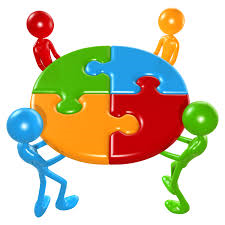One of the most important moments from semester 1, for me, was the preparation for our Working Together assignment. From the beginning of the semester we were split into groups that consisted of those studying Education, Social Work and CLD. Recalling on this, I didn’t understand why these three were put together at all. But this was a great opportunity for us all to begin to understand the importance of why these three professions needed to work collaboratively. And it all makes perfect sense now.
 Our assignment consisted of two parts – a group presentation and an academic poster of our learning. For our group presentation we had to go on a visit to a local agency – Aberlour Options. We had to find out about the agency, organise questions that would help us find out what they do, how they work together with other agencies and ultimately prepare us for our assignment.
Our assignment consisted of two parts – a group presentation and an academic poster of our learning. For our group presentation we had to go on a visit to a local agency – Aberlour Options. We had to find out about the agency, organise questions that would help us find out what they do, how they work together with other agencies and ultimately prepare us for our assignment.
At first, working together with new people while still trying to get to know each other was difficult. However, we soon overcame the awkwardness and worked hard to organise meet-ups. As a group, we decided early on that an important part of a successful group is ensuring that everyone feels included and so we organised ways in which everyone could stay up-to-date with what was being done for the visit and assignment. I believe this was a significant part of our group’s success as not everyone was based in Dundee – meaning that travel issues and other commitments could have impacted how well we were all going to do if this wasn’t spoken about.
I believe our visit to the agency went well – we gained the information we needed and the confidence from organising and interviewing someone we didn’t know at all. I felt very happy with how this went.
After our interview with the agency, we continued to organise regular meet-ups in order to ensure we were going to do our best in our upcoming assignment. I believe I was a good team worker in the group as I made sure to be available for meet-ups and contributed to the discussion at Aberlour and the group presentation.
However, now I look back I wish I had felt more confident in sharing my thoughts and ideas and this is something I hope to work on. According to Schon, “we reflect on action, thinking back on what we have done in order to discover how our knowing-in-action may have contributed to an unexpected outcome.” (Schon, 1983, p26). Although I am happy with how this assignment went, there are things that I would have liked to have done differently but I believe it is a positive to realise this and a reason to keep working harder.
References:
Schon, D (1983). The Reflective Practitioner. London. Temple Smith

 Our assignment consisted of two parts – a group presentation and an academic poster of our learning. For our group presentation we had to go on a visit to a local agency – Aberlour Options. We had to find out about the agency, organise questions that would help us find out what they do, how they work together with other agencies and ultimately prepare us for our assignment.
Our assignment consisted of two parts – a group presentation and an academic poster of our learning. For our group presentation we had to go on a visit to a local agency – Aberlour Options. We had to find out about the agency, organise questions that would help us find out what they do, how they work together with other agencies and ultimately prepare us for our assignment.